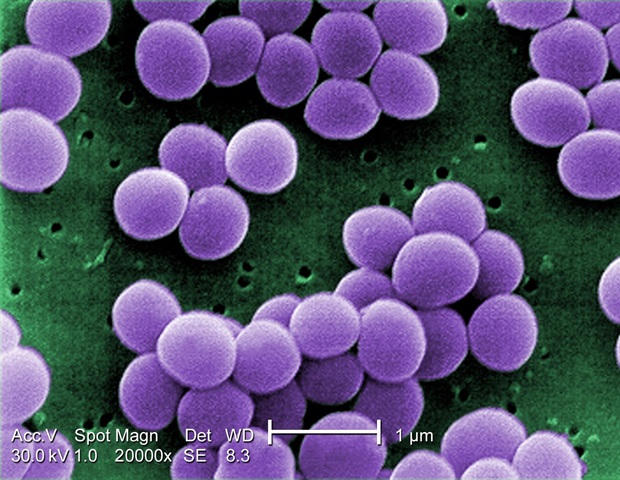
Scientists have found the mechanism which permits the superbug Methicillin Resistant Staphylococcus aureus (MRSA) to change into extremely proof against antibiotics, paving the best way for brand spanking new approaches to regulate infectious illness.
MRSA is an antimicrobial resistance (AMR) superbug that causes over 120,000 deaths per 12 months. Given the pressing want for brand spanking new, simpler antibiotics and a scarcity of MRSA vaccines, understanding and combating the superbug is essential.
The brand new analysis, led by the College of Sheffield, reveals MRSA has a double defence mechanism in opposition to antibiotics – this new perception presents hope in treating the life-threatening superbug and different infectious ailments.
Micro organism, equivalent to MRSA, have mesh like cell partitions round them that require enzymes to knit them collectively. The enzymes are the targets for antibiotics equivalent to penicillin and methicillin. This kind of antibiotic has saved tens of millions of lives over the a long time.
It has been recognized for a few years that in an effort to be resistant, MRSA has acquired a brand new cell wall enzyme that permits it to outlive publicity to antibiotics. Nonetheless, the Sheffield researchers have discovered that this alone is inadequate for survival.
The brand new research exhibits MRSA has additionally advanced an alternate division mechanism that permits it to copy within the presence of antibiotics. This beforehand unknown mechanism is crucial for MRSA resistance. By understanding the small print of this course of, researchers are working in the direction of creating inhibitors that may goal MRSA’s novel survival technique.
This analysis could be very thrilling because it has not solely uncovered a brand new mechanism for MRSA, that was hiding in plain sight, but additionally the power of the micro organism to divide in an alternate means. These findings have necessary ramifications for the event of latest antibiotics, but additionally for understanding the basic ideas that underpin bacterial progress and division. It will present new methods to deal with this harmful infectious organism.”
Simon Foster, Professor, Faculty of Biosciences, College of Sheffield
Professor Jamie Hobbs from the College of Sheffield’s Faculty of Mathematical and Bodily Sciences mentioned: “It is a unbelievable instance of how physics and biology could be introduced collectively to grasp the urgent societal problem of antimicrobial resistance. We couldn’t have made the discoveries with out this synergy, fusing world main microscopy, with genetics and microbiology.
“Our analysis demonstrates the facility of an interdisciplinary method to handle the fundamental mechanisms supporting the physics of life that are of such significance to healthcare”.
The following step for this analysis is to find out how MRSA is ready to develop and divide within the presence of antibiotics utilizing the brand new mechanism that has been found. This analysis includes a multidisciplinary collaboration, led by the College of Sheffield with worldwide companions and funded by Wellcome and UKRI.
Supply:
Journal reference:
Adedeji-Olulana, A. F., et al. (2024) Two codependent routes result in high-level MRSA. Science. doi.org/10.1126/science.adn1369.

